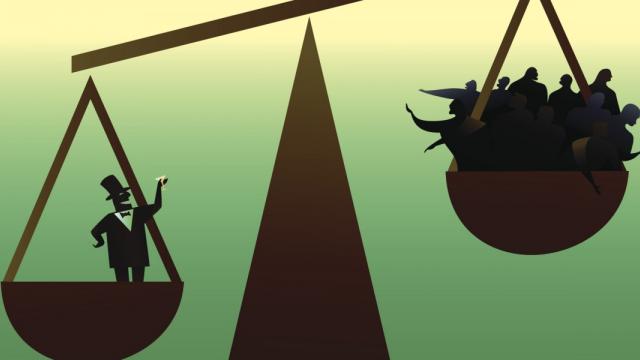
The 12 months that ended this past summer, suggests the just-released annual Global Wealth Report from the Swiss bank Credit Suisse, ought to be cause for celebration. The world has never been richer. Credit Suisse’s researchers have discerned “a significant increase in wealth across the globe.” Net worth worldwide has increased by a remarkable $16.7 trillion over just the past year.
So why aren’t people worldwide cheering? That “significant increase in wealth,” the new Credit Suisse numbers make clear, has benefited only a precious few. The top 1 percent globally now hold 50.1 percent of the world’s household wealth, up from 45.5 percent at the start of the century.
Within that top 1 percent, the really rich — deep pockets with at least $50 million in net worth — are clearly leading the way. Since 2000, Credit Suisse calculates, the wealth of this “ultra high net worth” cohort has multiplied “five-fold.”
About half of these ultras, 49 percent, reside today in the United States. Credit Suisse counts 72,000 of these ultra-rich Americans. Some context: China, the host to the world’s second-highest collection of $50 million-and-up personal fortunes, has only 18,100 ultras.
Some additional context: The United States hosts over 25,000 more ultra-rich individual fortunes than the nations with next nine highest ultra-rich totals combined.
The Trickle-Down
How much of this enormous wealth at America’s economic summit trickles down to average Americans? Not much.
At first glance, that doesn’t appear to be the case. The average American adult, the Credit Suisse data show, boasts $388,585 in net worth. Only two other nations in the world — Switzerland and Australia — have higher net worth averages.
But wealth averages can be deceiving. They represent a nation’s total household net worth divided by the nation’s total number of adults. The more wealth a nation’s rich hold, the higher the average will be. A nation of one millionaire and nine other adults with no wealth at all would have an average individual net worth of $100,000.
So net worth averages can tell us next to nothing about the actual life experience of the typical person. To see how a nation’s most typical adults are doing, we need instead to calculate each nation’s median adult net worth. That means finding the net-worth level that represents the point at which half a nation’s adults have more wealth and half have less.
The new 2017 Credit Suisse Global Wealth Report helpfully calculates these medians. Switzerland and Australia again top the global list. The typical Swiss adult has a net worth of $229,000. The typical Australian, $195,400. And the typical American? A mere $55,876. Twenty nations in all have higher median adult net worths than the United States.
The True Cost of Inequality
Just how much is inequality costing ordinary Americans? Comparing the United States to other more egalitarian-minded developed nations can give us a vivid sense of the high toll that inequality exacts. Take, for instance, the example of Japan, one of the world’s most equal nations.
In their new Global Wealth Report, Credit Suisse’s researchers describe the 2017 Japanese economy as “still in the doldrums.” But ordinary Japanese households would almost certainly take their “doldrums” over the economic status quo in the United States any day of the week.
The numbers explain why. The United States has over 50 times more ultra-rich than Japan, and that enormous wealth at the top has the U.S. average net worth towering over the average Japanese net worth, by a $388,586 to $225,057 margin. But Japan shares its household wealth far more equally than the United States. The typical Japanese adult holds $123,724 in net worth, much more than double the $55,876 U.S. median adult net-worth figure.
Ordinary Americans, in effect, are each paying what amounts to an “inequality tax.” If we distributed our wealth as equally as the Japanese distribute theirs, the typical American would likely be somewhere around $100,000 richer.
Or take Australia, a nation that now sports almost the exact same average adult wealth as the United States. The average Aussie has a $402,603 net worth, just a bit above the average American’s $388,586. The net worth of the median — most typical — Australian? A stunning $195,417, four times the median adult net worth in the United States.
Australians used to see their nation as a relatively equal society. They don’t anymore. Rising inequality has become a major Australian political issue. But Australia remains far more equal a society than the United States. The top 1 percent in Australia only holds an estimated 15 percent of the nation’s wealth.
America’s top 1 percent, Federal Reserve researchers reported earlier this fall, now holds 38.6 percent.
3 WAYS TO SHOW YOUR SUPPORT
- Log in to post comments











